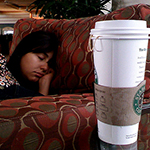 |
Starbucks, which ranks among the country’s most socially responsible companies, is taking heat from social media critics who blasted it for apparently opening its doors, restrooms and patios to anybody who wants to hang out or use its restrooms.
On May 19, Starbucks released its “use of the third-place policy” in which it expressed its commitment to “creating a culture of warmth and belonging where everyone is welcome.”
The chain reinforced its somewhat starry-eyed mission “to inspire and nurture the human spirit—one person, one cup and one neighborhood.” To paraphase the great James Carville, "It's the coffee, stupid."
The Starbucks policy redefined the word “customer” to include anyone who wants to use its spaces whether he buys a Cup of Joe or not. That’s downright crazy.
The chain’s critics fear that hordes of homeless people will turn Starbucks cafes into shelters, while drug users will flock to its bathrooms. That's a tad much. It’s doubtful that the homeless or drug users are close followers of Starbucks’ corporate pronouncements.
The company today clarified its policy, telling the Wall Street Journal that employees will not tolerate disruptive behavior, which includes sleeping, improper use of bathrooms, smoking and drug/alcohol use. What a relief!
I’m a fan of Starbucks and its corporate philosophy.
The Seattle-based company though lost a stride or two since last month’s embarrassment in Philadelphia when a manager called the police about two black men who used its bathroom without buying anything.
Starbucks executive chairman Howard Schultz told a think tank earlier this month that the company didn’t want to be a public restroom.
But in places like New York City, which is notorious for its lack of public restrooms, Starbucks is the go-to place for people who have to go.
Starbucks’ new policy statement was an overreach, codifying open bathroom access to also include tables, chairs and patios. But like it or not, Starbucks is a business owned by shareholders who want the best financial returns for their investment. Stockholders tend to be biased toward paying customers.
Following the Philadelphia fiasco, Starbucks announced a plan to close its doors for the afternoon of May 29 for a round of anti-bias education.
Leaders of those sessions now have more to talk about.


 Southern governors claim they know what's best for their working class, and it's not pay raises... A Ukrainian human rights group played a key role in convincing House Speaker Mike Johnson to hold a vote to send arms to Ukraine, Israel and Taiwan... Trump Media & Technology Group blames short-selling and not lousy outlook for its stock slump.
Southern governors claim they know what's best for their working class, and it's not pay raises... A Ukrainian human rights group played a key role in convincing House Speaker Mike Johnson to hold a vote to send arms to Ukraine, Israel and Taiwan... Trump Media & Technology Group blames short-selling and not lousy outlook for its stock slump. The techniques deployed by OJ Simpson's defense team in the 'trial of the century' served as a harbinger for those used by Donald Trump... People worry about the politicization of medical science just as much as they fret about another pandemic, according to Edelman Trust Barometer... Book bans aren't restricted to red states as deep blue Illinois, Connecticut and Maryland challenged at least 100 titles in 2023.
The techniques deployed by OJ Simpson's defense team in the 'trial of the century' served as a harbinger for those used by Donald Trump... People worry about the politicization of medical science just as much as they fret about another pandemic, according to Edelman Trust Barometer... Book bans aren't restricted to red states as deep blue Illinois, Connecticut and Maryland challenged at least 100 titles in 2023. The NBA, which promotes legalized gambling 24/7, seems more than hypocritical for banning player for placing bets... Diocese of Brooklyn promises to issue press release the next time one of its priests is charged with sexual abuse... Truth Social aspires to be one of Donald Trump's iconic American brands, just like Trump University or Trump Steaks or Trump Ice Cubes.
The NBA, which promotes legalized gambling 24/7, seems more than hypocritical for banning player for placing bets... Diocese of Brooklyn promises to issue press release the next time one of its priests is charged with sexual abuse... Truth Social aspires to be one of Donald Trump's iconic American brands, just like Trump University or Trump Steaks or Trump Ice Cubes. Publicis Groupe CEO Arthur Sadoun puts competition on notice... Macy's throws in the towel as it appoints two directors nominated by its unwanted suitor... The Profile in Wimpery Award goes to the Ford Presidential Foundation for stiffing American hero and former Wyoming Congresswoman Liz Cheney.
Publicis Groupe CEO Arthur Sadoun puts competition on notice... Macy's throws in the towel as it appoints two directors nominated by its unwanted suitor... The Profile in Wimpery Award goes to the Ford Presidential Foundation for stiffing American hero and former Wyoming Congresswoman Liz Cheney. JPMorgan Chase chief Jamie Dimon's "letter to shareholders" is a must-read for PR people and others interested in fixing America and living up to its potential... Get ready for the PPE shortage when the next pandemic hits... Nixing Netanyahu. Gaza carnage turns US opinion against Israel's prime minister.
JPMorgan Chase chief Jamie Dimon's "letter to shareholders" is a must-read for PR people and others interested in fixing America and living up to its potential... Get ready for the PPE shortage when the next pandemic hits... Nixing Netanyahu. Gaza carnage turns US opinion against Israel's prime minister.


 Have a comment? Send it to
Have a comment? Send it to 
No comments have been submitted for this story yet.